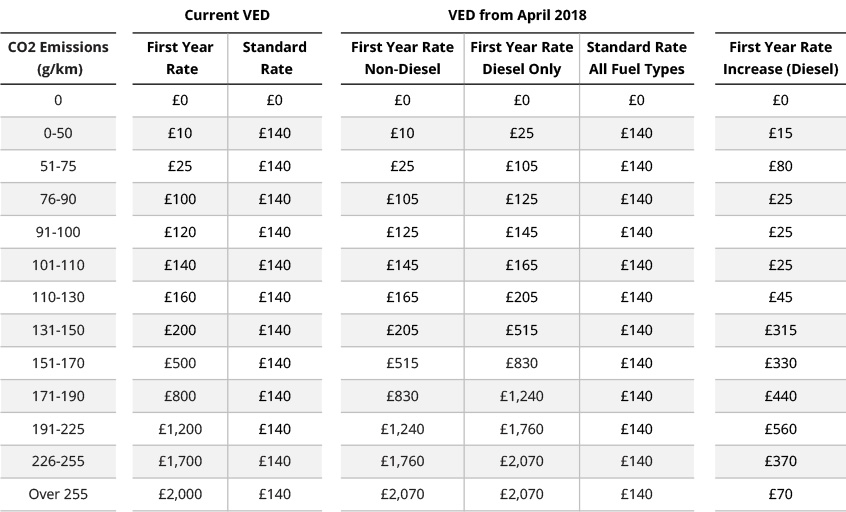S h a r e
VED rates for Diesels are changing – we explain how you could be affected


Posted by
Kevin Blackmore
January 2018
Changes in Vehicle Excise Duty which come into effect from April may cause many companies to re-assess the mix of vehicles on their fleet in the light of the new charges.
Chancellor Philip Hammond announced in November that all new diesel cars from April 1 this year will face going up a VED band if they fail to meet the latest Euro 6 standards under real-world testing.
New cars will have to meet the real driving emissions (RDE) step 2 test that forms part of the current EU type approval process. To avoid going up a tax band new cars can pollute no higher than 1.5 times the current 80mg/km NOx limit under real-world driving conditions.
According to the Treasury’s estimates, less than two million cars will be subject to the VED band jump, though cars like the Ford Fiesta are expected to see a £20 rise in the first-year VED rates. Higher polluting models, like the Porsche Cayenne, are expected to see their first year rates go up by £500.
The changes only apply to new diesel cars, not vans, and do not impact the new £140 yearly fees all cars have to pay after the first year.
Any car failing to meet the Euro 6 standards in real world testing would move up a band, and thus pay anything from £15 to £560 more in first year rates. The new diesel rates are as follows:
Comparison of new diesel tax bands from April 2018 to current bands
Under the current VED system announced by then Chancellor, George Osborne, in the Spring Budget of 2016, new cars registered after April 1 2017 pay a one-off tax charge for the first year, based on their carbon emissions, in a CO2-based tax band system.
Compared to the pre-April 2017 tax bands, most drivers will have seen their first-year tax charge increase in the current 2017/18 year, with only zero-emissions vehicles paying nothing at all.
From the second year of ownership onwards, the CO2 scale becomes irrelevant, as two flat rates are then applied – a £0 VED rate for zero-emission vehicles only, and a flat annual rate of £140 for all other cars.
However, cars costing over £40,000 are also liable for the £140 VED rate from year two and will also be forced to pay an additional annual ‘supplement’ of £310 for five years, a total of £450 a year. Once the five-year period is over they revert to the £140 flat rate.
It’s important to note that the current tax rates only apply to new cars registered after 1 April 2017. Cars registered before that date will continue to pay the old rates.
As with the introduction of many new schemes, there are winners and losers across the board. When it was first announced, many commentators queried why Ultra Low Emission Vehicles (ULEVs) are now subject to VED, rather than being incentivised with a zero rate as before.
For example, non-diesel ULEVs emitting less than 50g/km of CO2 will from last April pay £10 in the first year of registration and £140 per year thereafter. Previously, they paid no VED at all.
The same applies to those emitting 51-75g/km. Previously paying no VED, from April 2017 they have been liable for £25 in the first year and £140 thereafter, while non-diesel cars emitting 76-90g/km now pay a charge of £105 in the first year and £140 thereafter.
Meanwhile, non-diesel cars emitting 91-100g/km, also previously zero rated, are charged at £125 in the first year, and £140 thereafter, an increase of £405 over the first three years of the vehicle’s operation.
“The new VED rules make fleet policy planning and selecting the right mix of vehicles for your fleet more important than ever before,” said Fleet Alliance managing director, Martin Brown.
You also might like…
If you liked this article then check out our posts about similar topics
Eurocell adds huge van order to fleet following advice from Fleet Alliance
Eurocell, the UK's leading upvc window, door and conservatory manufacturer and distributor, has replaced a large proport...
Fleet Alliance archives Intelligent Car Leasing brand to focus on core fleet business
Fleet Alliance has discontinued its Intelligent Car Leasing brand, which specialised in consumer leasing The Glasgow ...
JG Pest Control updates fleet with new Peugeot Partners from Fleet Alliance
JG Pest Control, one of the country’s leading pest control operators, has updated its fleet thanks to a new batch of P...
Warp Snacks opts for EV salary sacrifice scheme with Fleet Alliance
Healthy snacks manufacturer Warp Snacks, has introduced an electric car salary sacrifice scheme for staff in conjunction...
Chancellor cuts National Insurance, extends fuel duty freeze and fully expenses leased assets
In the last Budget before the General Election, Chancellor Jeremy Hunt unveiled a series of headline-grabbing initiative...
2024 will be the year of the EV with greater supply and lower prices, says Fleet Alliance
2024 will be the year that companies look to accelerate down the electrification route, as they seek to meet their own E...
Automotive transmission specialist Xtrac opts for EV salary sacrifice scheme from Fleet Alliance
Xtrac, the world’s leading supplier of high-performance transmissions for top level motorsport and high-performance au...
Fleet Alliance reports strong uptake in EV salary sacrifice
Increasing numbers of businesses are adding the employee benefit of leasing an EV through a salary sacrifice scheme to t...
Ready to make the management of your fleet more efficient?
Request a call back

